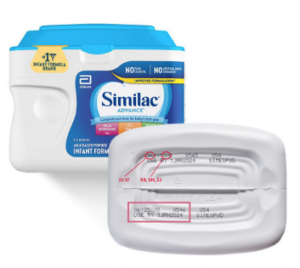By George Fuchs, MD
Kentucky Children’s Hospital
The FDA recently announced that certain infant formulas may potentially be contaminated with bacteria. The formulas, all manufactured at one factory in the United States, have been recalled. Five babies who received the formulas developed Cronobacter sakazakii or Salmonella newport infections. The recall only affects certain types of powered formulas, including both for healthy children and those with special medical needs.
If the formula you use has been recalled, or you’re not sure if it’s included in the recall, check the product number printed on the bottom of the container. Visit www.similacrecall.com or call 1-800-986-8540 to see if your formula has been recalled. Stop feeding it to your baby and return it to the place where you purchased it to receive a refund.
If your formula has been recalled, you can switch to another brand, including store brands. Powdered formulas not included in the recall and ready-to-feed liquid formulas are still safe to use.
However, if your baby is receiving Similac PM 60/40, there is no other commercially available alternative. Your child’s primary care provider can direct you to a pediatric dietitian to help you make it from a recipe. If you are receiving WIC, your child’s pediatrician will need to approve a substitution.
Recent supply chain shortages due to the COVID-19 pandemic have made it difficult to find certain formulas. If you’re having trouble sourcing formula, your pediatrician or local WIC office may have some suggestions. Never water down formula to make it last longer; watering down formula is dangerous and can cause nutritional imbalances in your baby and lead to serious health problems.
Plant-based milk alternatives are not recommended for infants under 6 months of age at any time. Soy milk can be given to babies over 6 months of age for a few days, but always buy the kind that is fortified with protein and calcium. Make sure you change back to formula as soon as some is available. Avoid almond or other plant milks as these are often low in protein and minerals.
And finally, be sure to check the formula cans carefully, as mixing instructions can be different for different formula brands. It’s also very important that formula is prepared in a clean environment with properly treated water and sterilized bottles to prevent contamination and risk of infection.
Dr. George Fuchs III, MD, is chief of pediatric gastroenterology at Kentucky Children’s Hospital.

















